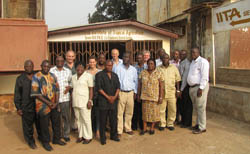With a grant of the H.G. Buffet foundation, N2Africa is currently expanding its activities into Liberia, Sierra Leone and north-Kivu in DRC. To kick-start activities in the new West-African countries, at the end of March meetings were held in both Sierra Leone and Liberia. The meeting in Sierra Leone even attracted a journalist, Richard Bockarie, who published the following piece in The UPDATE Newspaper of 22-03-2012.
In Sierra Leone, the project will cover production, utilization and marketing of improved varieties of soyabean, cowpea and groundnut. Whilst farmers in Sierra Leone are very familiar with the cultivation of groundnut and cowpea, soyabean is relatively new.
A two-day N2Africa-Sierra Leone implementation planning workshop has been hosted by the Sierra Leone Agricultural Research Institute (SLARI) and at its Headquarters, Tower Hill, Freetown, 19 and 20 March 2012. 21 representatives from organizations primarily responsible for agricultural research (SLARI) degree-related training (Njala University and University of Sierra Leone/Fourah Bay College), technology dissemination (NGOs: World Vision, Welt Hunger Hilfe, COORD-SL), and commercial production of weaning food Bennimix Food Company SL Ltd) and poultry feed (Sierra Akker Agricultural Company Ltd) participated in the workshop.
Welcoming participants, the Director-General of SLARI, Dr. Alfred Dixon said the project was timely, more so against the background of huge yield losses caused by deteriorating soils.
The Regional Project Coordinator, IITA-Kenya Dr Bernard Vanlauwe told the workshop that soil infertility can be halted and reversed if specific varieties of grain legumes are integrated in cropping systems to capture nitrogen from the air and make it available to crops in the form of natural fertilizer.
Dr. Braima James, IITA Country Representative in Sierra Leone, indicated additional nutritional and economic value of grain legumes in local food industries, especially the use of soyabean to nutritionally fortify gari and other cassava products, weaning foods and poultry feed.
Farming Systems Researcher Dr. Franke Linus from Wageningen University emphasized that in putting nitrogen fixation to work for smallholder farmers, the project will contribute to strengthen national research capacity, introduce new and improved varieties of food grain legumes, increase the area of land cropped with legumes, enhance soil fertility, increase legume productivity, link smallholders to markets and help create new enterprises to increase demand for legumes.
Through the project, IITA and WU will contribute to existing efforts to strengthen grain legume research capacity at SLARI. For technology dissemination, the project will work through selected NGOs to enable farming communities to produce soyabeans, cowpea and groundnut in quantities and quality to meet public and private sector demands.
Mr. Pakai Kamara, Managing Director Sierra Akker Agricultural Company Ltd (which produces feed for poultry industries) and Dr. Philip Kanu, R&D Manager at Bennimix Food Company SL Ltd (a baby food industry), both enthusiastically welcomed the project and indicated that they will each provide guaranteed market for locally grown soyabean which is desperately needed by their respective industries.
|
Workshop discussions provided basis for agreements on legumes of interest, operational areas, technology development/adaption and dissemination activities, post-graduate training needs, timelines and logistics for implementation of planned activities. These ideas were further refined during group work on day 2 of the meeting. Participants, who formed the nucleus of N2Africa-Sierra Leone partners, expressed their commitment to work with IITA and WU to make N2 Africa work in Sierra Leone and provide more opportunities for food security and income generation especially through smallholder production and commercialization of soyabean, cowpea and groundnut. |
 |
Braima James
